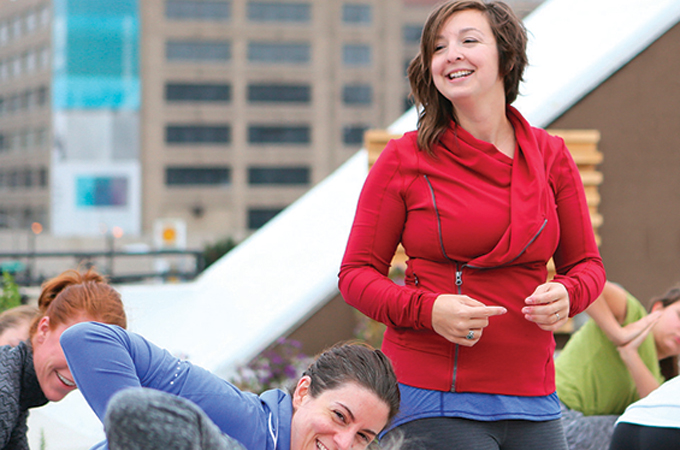If there’s one thing St. Louisans are good at, it’s doing good. We are, after all, routinely labeled as one of the most philanthropic communities in the country. Town&Style chatted with two unique nonprofits striving to make our corner of the world a little nicer through sport.
yoga buzz
“Yoga is like grown-up recess,” proclaims certified yoga instructor Elle Potter, who founded Yoga Buzz in 2014 with the mission of making it accessible to a wider range of St. Louisans. To that end, the nonprofit hosts a steady stream of pop-up events. Each involves yoga in a unique setting, followed by drinks, food, music or some other social activity. The location can be anywhere from a cultural landmark to a brewery or restaurant. For newbies, the classes are approachable; for dedicated yogis, the events provide a fun twist on studio practice. One particularly memorable event, Potter says, was in the Peabody Opera House’s grand lobby, where the yoga session was accompanied by a string ensemble from the Chamber Project.
Potter’s desire to increase access to yoga, particularly to underserved areas, stems from the benefits she herself has experienced. “It’s been a way to learn how to better live with my own anxiety disorder, so I can function on days when I would rather crawl into bed,” she says. “So many people are disconnected from their body and emotions. Yoga offers a way to connect.”
The $20 to $30 ticket price to Yoga Buzz’s events helps fund its need-based scholarship program. Individuals granted scholarships attend classes at a studio near them free of charge. Currently, about two dozen people are in the program; each is required to document his or her journey. Yoga Buzz also offers a teacher training program that trains people who wish to bring the practice to underserved communities. One woman in the program is larger-bodied, Potter says, and she wants to work with others like her. “For a lot of larger people who go into a class, the teacher has no idea how to accommodate them, so they can feel like they don’t belong,” she explains.
Potter’s resolve to reach more diverse communities was sharpened after she hosted an event at Ferguson Brewing Company to raise funds for the Ferguson Youth Initiative after the 2014 unrest. “I looked around at that event and saw a bunch of white ladies—the same women who would go to yoga no matter what,” Potter says. “It was a key moment in understanding what ‘accessible’ and ‘inclusive’ really means. I knew then that if I really wanted to share the practice with the city, I needed to understand who is showing up and not showing up and why.”
Potter’s efforts are starting to take root. “I’m seeing a little more diversity at yoga class, more variance in ability, body type and age, as well as more people of color,” she says. “But when there are teachers in leadership roles who represent these different communities, that’s when I think things are really going to change.”
brackets for good
We’ve all experienced it: The Cardinals are killing it in the World Series or the Blues triumph over the Blackhawks in the race to the Stanley Cup, and the whole city seems to join together in hometown pride. When Indiana residents Matt McIntyre and Matt Duncan experienced that fervor over Butler University’s basketball team in 2011, they decided to find a way to channel that type of energy into something positive. That’s how Brackets For Good was born.
Each March, in the spirit of March Madness, Brackets For Good hosts online, bracket-style fundraising competitions among nonprofits. There is no fee for the nonprofits to participate, and for each dollar raised on bracketsforgood.org, the nonprofits gain one point. At the end, the nonprofit with the most points takes home an extra $10,000 courtesy of a corporate sponsor.
The first competition, held in Indianapolis, took place in March 2012. Since then, more than $1.3 million has been raised on bracketsforgood.org, and the nonprofit has expanded to host tournaments in multiple cities. This year, it came to St. Louis for the first time, racking up more than $190,000 in donations. Local nonprofits jumped at the chance to participate, with nearly 100 signing up (only 64 are selected to play). Registration for 2017 continues until late October.
Beyond providing an innovative way to raise funds, Brackets For Good also offers participating nonprofits a mini crash course on engaging audiences online. “We give them logos, graphics, sample social media posts, and a referral tracking tool that helps them identify what links or images are getting engagement online,” McIntyre says.
The 2016 winner was Athletes for Animals, a nonprofit run by Blues player David Backes. The path to victory can be cutthroat: Athletes For Animals beat out Heroes Care by only $200. The winner took home a check for $40,000. “It was a fantastic experience and a great way to engage the public,” says Backes, who promised to let one donor shave his head if the organization won.
A major draw in Brackets For Good’s success is the low bar for participation—there is no minimum donation required. “If our mission is to help spread awareness of the nonprofit sector and help people flex their donation muscles for the first time, we knew there had to be no minimum,” McIntyre says. “You don’t have to give up a Saturday, you don’t have to buy a gala ticket, and you can still make an impact.” In St. Louis, 49 percent of the donations were from first-time donors.
Pictured: Elle Potter at a Yoga Buzz event
